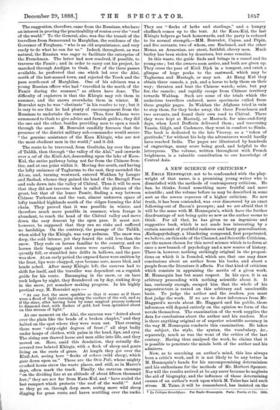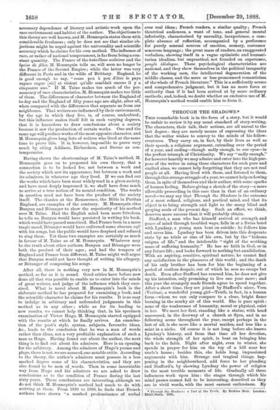A NEW SCIENCE OF CRITICISM.*
M. EMILE HENNEQUIN, not to be confounded with the play- wright of that name, is a promising young writer who is dissatisfied with the methods of contemporary criticism. He has, he thinks, found something more fruitful and more scientific ; and the volume before us may be described in some sort as the novum crrganum of a higher criticism. No new truth, it has been contended, was ever discovered by an exact following-out of Bacon's precepts ; and we are afraid that it will be the same with M. Hennequin's, which have the further disadvantage of not being quite so new as the author seems to think. For all that, he has given us an ingenious and suggestive book, which is not made less interesting by a certain amount of youthful rashness and hasty generalisation. lEsthopsychology, a blundering compound, first perpetrated, we believe, orrthis side of the Channel, and Scientific Criticism, are the names chosen for this novel science which is to form at once a new branch of psychology and a new source of history. There is, however, nothing strikingly original in the proposi- tions on which it is founded, which are, that one may draw conclusions about an author from his books, and about a people from the literature it affects. For that kind of criticism which consists in appraising the merits of a given work, M. Hennequin has but scant respect. In his eyes, it is an arbitrary proceeding with nothing scientific about it. It has, curiously enough, escaped him that the whole of his superstructure is reared on this arbitrary and unscientific basis. To judge the author and the readers, you must first judge the work. If we are to draw inferences from Mr. Haggard's novels about Mr. Haggard and his public, those inferences will depend entirely on the opinion we form of the novels themselves. The examination of the work supplies the data for conclusions about the author and his readers. Nor is there anything original or of superior scientific accuracy in the way M. Hennequin conducts this examination. He takes the subject, the style, the syntax, the vocabulary, &c., separately, much as was the wont of the critics of the last century. Having thus analysed the work, he claims that it is possible to penetrate the minds both of the author and his admirers.
Now, as to searching an author's mind, this has always been a critic's work, and it is not likely to be any better in M. Hennequin's hands for his uncompromising determinism and his enthusiasm for the methods of Mr. Herbert Spencer. Nor will the results arrived at be any surer because he neglects the aid of biography, and the influence of those determining causes of an author's work upon which M. Tains has laid such stress. M. Taine, it will be remembered, has insisted on the
• La Critique Scientifique. Par Emile Hennequin. Paris: Perrin et Cie. 1888. necessary dependence of literary and artistic work upon the race environment and habitat of the author. The objections to this theory are well known, and M. Ramequin states them with considerable freshness ; only he does not see that similar ob- jections might be urged against the universality and scientific accuracy which he claims for his own method. The influence of race, or rather of national temperament, is far from being a con- stant quantity. The France of the bataillons scolaires and the kcees d,e filles, M. Hennequin tells us, will soon no longer be the France of the Second Empire; while the latter was very different in Paris and in the wilds of Brittany. England, he is good enough to say, "cease peu h pen d'être le pays rapace rogue [sic] et violent qu'elle semblait encore il y a cinquante ans." If M. Taine makes too much of the per- manency of race characteristics, M. Hennequin makes too little of them. The differences of character between the England of to-day and the England of fifty years ago are slight, after all, when compared with the differences that separate us from our neighbours. That writers are influenced by their environment, by the age in which they live, is, of course, undoubted ; but this influence makes itself felt in such varying degrees, that it is hazardous to draw conclusions about a society because it saw the production of certain works. One and the same age will produce works of the most opposite character, and la. Hennequin gives long lists of writers who lived at the same time to prove this. It is, however, impossible to prove very much by citing Addison, Richardson, and Sterne as con- temporaries.
Having shown the shortcomings of M. Taine's method, M. Hennequin goes on to propound his own theory, that a connection is to be looked for, not between a work and the society which saw its appearance, but between a work and its admirers, in whatever age they lived. If we can find out the works which have been most widely read in a given society, and have most deeply impressed it, we shall have done much to arrive at a true notion of its mental condition. The works in question need not have been the product of the society itself. The classics at the Renascence, the Bible in Puritan England, are examples of the contrary. M. Hennequin cites Bunyan and Beranger to show the superiority of his method over M. Taine. Had the English mind been more frivolous, he tells us, Bunyan would have persisted in writing his book, which would have passed unnoticed. Had France been in a more tragic mood, Beranger would have enlivened some obscure café with his songs, but the public would have despised and refused to sing them. Yet these two examples are certainly as much in favour of M. Taine as of M. Hennequin. Whatever may be the truth about other authors, Bunyan and Beranger were both the product of their ages ; and had the tempers of 'England and France been different, M. Taine might well argue that Bunyan would not have thought of writing his allegory, or Beranger of composing his songs.
After all, there is nothing very new in M. Hennequin's method, so far as it is sound. Good critics have before now done all that was possible to enable us to enter into the minds of great writers, and judge of the influence which they exer- cised. What is novel about M. Hennequin's book is the elaborate method he has prepared for examining a book, and the scientific character he claims for his results. It is as easy to indulge in arbitrary and unfounded judgments in this method as in any other ; while as for its leading to new results, we cannot help thinking that, in his specimen examination of Victor Hugo, M. Hennequin started equipped with the results at which he finally arrives. An examina- tion of the poet's style, syntax, subjects, favourite ideas, &c., leads to the conclusion that he was a man of words rather than ideas, not a very profitable explanation of such a man as Hugo. Having found out about the author, the next thing is to find out about his admirers. Here is an opening for the arbitrary. Among the admirers of Ffugo's poems and plays, there is not, we are assured, one notable critic. According to the theory, the author's admirers must possess in a less marked degree some of his characteristics, and they are also found to be men of .words. Then in some inscrutable way from Hugo and his admirers we are asked to draw conclusions as to the condition of France during the last sixty years. These conclusions are interesting, although we do not think M. Hennequin's method had much to do with arriving at them. From 1830 to 1888, he finds that French authors have shown "a marked predominance of verbal over real ideas ; French readers, a similar quality ; French theatrical audiences, a want of tone, and general mental inferiority, characterised by unreality, inexperience, a com- plete absence of reflection, accompanied by a preference for purely sensual sources of emotion, scenery, costumes sonorous language ; the great mass of readers, an exaggerated verbalism, showing itself in a vague optimistic and humani- tarian idealism, but impractical, not founded on experience, peuple ideologue. These psychological characteristics are national, and they show themselves in the political incapacity of the working men, the intellectual degeneration of the middle classes, and the more or less pronounced romanticism of the whole of French literature." This is a sufficiently severe and comprehensive judgment, but it has no more force or authority than if it had been arrived at by more ordinary methods; and, indeed, we doubt whether an exclusive use of M. Hennequin's method would enable him to form it.



































 Previous page
Previous page